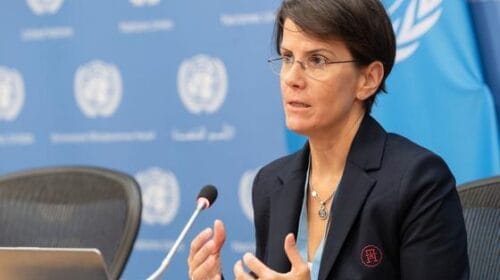Listen to older people’s ‘suggestions and ideas’ for more inclusive societies, urges UN chief
“Older people must be a priority in our efforts to overcome COVID 19”, Secretary-General António Guterres said in his message for the 30th anniversary of the International Day of Older Persons, celebrated annually on 1 October.
He shone a light on the need to examine how the pandemic might change how we address age and ageing in our societies, stressing that more opportunities and increased access to health, pensions and social protection for older persons were “crucial”.
In releasing his policy guidance on making the lives of older persons better, back in May, the top UN official pointed out the overall coronavirus fatality rate is higher for them. Because of this greater impact, he maintained that policy interventions must be targeted towards raising more awareness of their special needs.
Caring for others
This year’s observance falls as the world is also marking the International Year of the Nurse and Midwife, which Mr. Guterres pointed out, “highlights the vital role of health and social workers, such as nurses and midwives”, responding to the pandemic.
Against the backdrop that women constitute the majority of these professionals – many of whom are older persons – he upheld that “the people who devote their lives to our care, and to the care of older persons, mothers and children…deserve far greater support”.
Elderly potential
He said it was important to make concerted efforts across the designated Decade of Healthy Ageing 2020 2030, to improve the lives of older persons, their families and communities.
“The potential of older persons is a powerful basis for sustainable development”, he flagged. “More than ever, we must listen to their voices, suggestions and ideas to build more inclusive and age friendly societies”.
‘Invisible’ people
Meanwhile, Claudia Mahler, the UN independent expert on the enjoyment of all human rights by older persons, flagged that the COVID-19 pandemic has magnified existing violations of elderly rights.
“Existing inequalities that older persons face in terms of access to health, employment and livelihood are exacerbated”, she said, and yet, “they are chronically invisible”.
Ms. Mahler said that information about older persons is “at best fragmented, at worst, non-existent” in most countries, which is why it’s imperative to shed light on structural and systematic ways in which they are being left behind.
“Data is a prerequisite for informed and successful public policy making” to close existing gaps, highlight older persons’ contributions to society, illustrate their diversity and change perceptions of later life – “especially for it to be more than an inevitable stage of deficit and decline”, she said.
Prioritize older people
The independent UN expert also called for older persons to be prioritized throughout the recovery phase of COVID-19 and beyond.
“It is essential to ensure the income security of older persons, in particular older women”, she said, highlighting that “universal old age pensions and adequate entitlement levels” are necessary for “inclusive long-term recovery”.
Moreover, socioeconomic relief measures and safety nets must be adopted immediately.
In the absence of a dedicated internationally-agreed legal framework, Ms. Mahler spelled out: “We must ensure that responses to this crisis specifically identify and prioritize older persons…during the pandemic response and recovery phases”.





